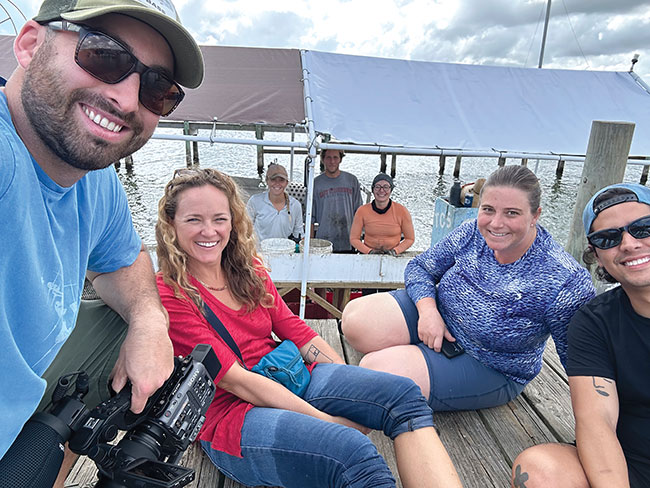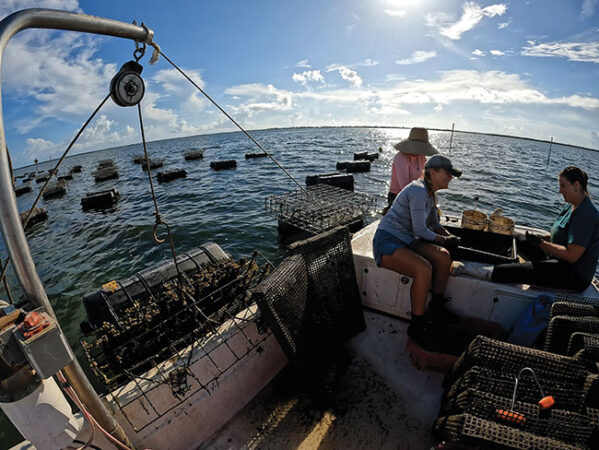
Sereia Films telling the industry’s stories
June 28, 2023
By Matt Jones
Florida-based nonprofit using film to educate
 (From left) Cinematographer Daniel Kaplan, Sereia Films Executive Director Sarah Curry, Treasure Coast Shellfish founder Nicolette Mariano and production assistant Nicky Del Pozo during the filming of an installment of “Eating Out: The Hunt for Sustainable Seafood.”
Photos: sereia films
(From left) Cinematographer Daniel Kaplan, Sereia Films Executive Director Sarah Curry, Treasure Coast Shellfish founder Nicolette Mariano and production assistant Nicky Del Pozo during the filming of an installment of “Eating Out: The Hunt for Sustainable Seafood.”
Photos: sereia films With misconceptions and misinformation about the aquaculture industry running wild in some areas, one non-profit film production company has made its mission to share the stories of the industry and to promote the good work being done. Sereia Films’ ongoing series, “Eating Out: The Hunt for Sustainable Seafood,” presents short-form documentaries on those who fish and farm in responsible and sustainable ways.
Founder and executive director Sarah Curry said that she had previously been working with a small production company in Miami that had primarily developed documentaries on fish farms, which would be screened around the world. When that company dissolved, she wanted to keep doing that same kind of work, but with a mind to making the content more accessible.
“I decided to start Sereia Films to create educational content, but making it more publicly available on these important issues that I thought more people should know about,” said Curry. “We honed in in the past few years specifically on seafood education, just because that’s my passion and area of expertise. And there is a huge hole to be filled as far as creating educational, inspirational content around these issues.”
Sereia Films’ subjects have thus far been based in the south of Florida – where the non-profit is based and a hotbed of fishing and fish farming activity. Curry noted that they are definitely interested in covering farms in other areas in the future, but specific plans and funding for that have not yet been put into place. However, most of their locally focused coverage would still be valuable and educational to audiences in other areas as they tie into larger issues that impact us all.
“The stories that we highlight at different farms and seafood producers and these issues – while they’re based in South Florida, they’re really kind of national and global issues of ‘where are we getting our food from now?’,” said Curry. “‘Where is it going to come from in the future?’ A lot of what we do is, I don’t want to say baseline education, but there’s still a lot of misinformation and misunderstanding around how our seafood is produced, the steps that it takes to get to our plate. And particularly with the blue foods movement and folks being more aware of how our food choices are impacting climate change and the realization that seafood can be a really climate change-friendly food.”
Some of the farms that Sereia Films have highlighted are undertaking efforts to limit energy consumption, or effective waste management or feed innovations. Curry is particularly interested in feed innovations and finding new and better ways to feed fish. She’s also very happy any time that she can highlight the accomplishments of women, as they are underrepresented in the industry.
“Nicolette Mariano, the woman who founded Treasure Coast Shellfish – which is the next film that we’re working on – she’s in her 30s, she’s an aquatic biologist and she’s working really hard to produce some awesome oysters off the east coast of Florida,” said Curry.
Additionally, the films attempt to address misconceptions about different seafood products. She noted that there is a perception that good oysters are not produced in Florida, for example, and the oysters found on menus in Miami are typically imported from elsewhere. While there are distribution issues that play a part in that, there is a negative connotation associated with warm water oysters.
“So for this one with [Mariano], I interviewed someone from the state regulatory agency who deals with these farms to show all the processes that are in place to maintain the safety and quality of the products,” said Curry. “Farms are required to harvest products by certain times, during certain months. There’s been huge improvements with refrigeration, traceability, and keeping products cold throughout the supply chain.”

Sereia Films make documentaries that explore seafood production, including farms such as Treasure Coast Shellfish as seen here.
“[Curry and Sereia Films] are amazing advocates,” said Mariano. “The different chefs that she meets, she’s gone out of her way to bring them samples and to educate them and getting the word out there. Especially since there’s only about three farms on the east coast of Florida right now doing oysters.”
Another species that can have a bad reputation is tilapia – chefs Curry has spoken with have turned their noses up at tilapia, but instead will import similar fish. A shame, she noted, when there are tilapia farms producing great fish within the state, mostly sold into the live market. A tilapia farm is planned to be the focus of a documentary later this year.
“Wouldn’t it be cool to have some Florida farmed tilapia on Florida menus?” said Curry. “Maybe it won’t be able to compete with imports, necessarily, but folks don’t even know that we’re growing this great seafood in our backyard. We took a look around and said ‘what are we growing here in Florida?’ As it turns out, we’re growing a lot but it’s not necessarily making its way to Floridians.”
While the films are aimed in many ways at addressing misinformation and misconceptions about seafood production, they are not merely propaganda for the industry. Curry noted that when the films are screened, she is inevitably asked about different rumours, outdated stereotypes, or specific examples of bad actors in the aquaculture sector.
“There’s always going to be folks who are not doing it the right way, in every industry,” says Curry. “And even these better farms have room for improvement. I think there’s naysayers about the seafood industry in general these days. And while that can be valid in certain instances, from my perspective, learning about this industry for the past 10 years and going to conferences, it seems like almost all the players across the industry are working to improve their systems, the materials they use, or the transparency.”
Sereia Films’ documentaries can be viewed on their Youtube and Vimeo pages, and they are currently working with a local Public Broadcasting System station to get them aired there.
Advertisement
- Open letter urges Trudeau to support industry
- Xylem launched its next-generation ultrasonic water meter





